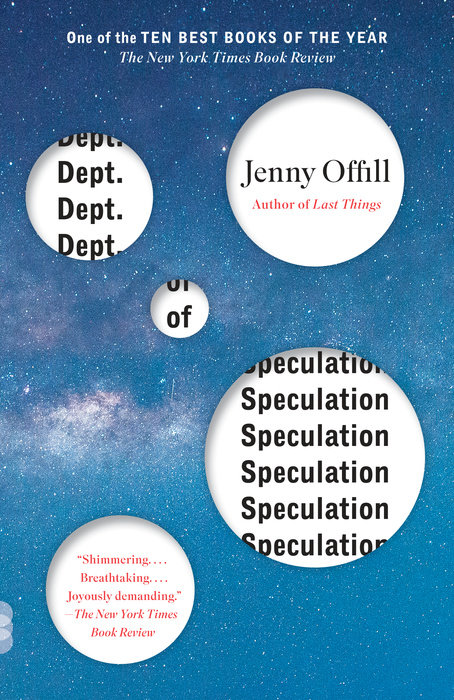Like those of my colleagues and friends in the publishing business, my to-read list lengthens at a daunting pace. There are heaps of books in my office, on my mantel, and on my bedside table, all taunting reminders that I will never conquer the ever-expanding canon of contemporary “must reads.” The towering stacks of reading material that surround me drive me to read ever more voraciously, devouring one book only to immediately toss it aside for the next.
And so there I was, buzzing along in my endless Sisyphean endeavor, when one stunning novel snapped me from this frenzied onward march. Dept. of Speculation refused to be a part of my careless crescendo, demanding attention and reflection with its dramatic prose. Its stunning representation of the quiet anguish inherent to settling into a life that has veered off course stopped me dead in my tracks.
Jenny Offill’s exquisite novel follows a nameless couple, weaving through time and space to depict a love complicated by the strains of monotony, parenthood, and infidelity. The couple seems blissfully in love, but hints of restlessness emerge as the wife takes on the domestic duties of motherhood. She loves her daughter, but becomes exasperated by her endless crying. When she discovers that the neon lit pharmacy in her neighborhood possesses the rare capacity to lull the baby to sleep, she takes to wandering its aisles for hours each day as a respite from the child’s maddening colic. As her daughter grows, so does the wife’s hostility towards her husband. His unceasing optimism, once a source of pride, now fuels her existential fury: “He won’t just think about how unbearable it is that things keep breaking, that you can never fucking outrun entropy.” Her frustration with her husband is amplified by her personal and professional dissatisfaction. Somewhere along the road to marriage and children, she has diverged so far from her ambitions that the life she inhabits has become unpalatable.
The wife’s narration, facilitated by the benefits of hindsight, paints doom from the very outset of their partnership. She “remembers the first night she knew she loved him, the way the fear came rushing in.” This detail, simple yet vivid, taps into the dread inherent to the human condition. We know, no matter how unbridled and boundless our affection, that we must bolster ourselves against its end. To avoid preparing for this moment is to leave ourselves impossibly vulnerable.
Dept. of Speculation is dense in this type of paralyzing detail. The wife recounts the slow, nearly imperceptible deterioration of their union: “For years, I kept a Post-it note above my desk. WORK NOT LOVE! was what it said. It seemed a sturdier kind of happiness.” Her tangential observations skirt cautiously around the borders of their collapsing relationship, serving to illuminate fissures from afar. Offill masterfully brings these innocuous details into sharp focus throughout the novel. While the wife invokes the wisdom of esteemed sources from Wittgenstein to Einstein to describe her inner turmoil, no words are as powerful in rendering her quiet desperation as her own.
Hilary Krutt works on the Subsidiary Rights team at Atria Books. You can follow her on Twitter @Hkrutt.








